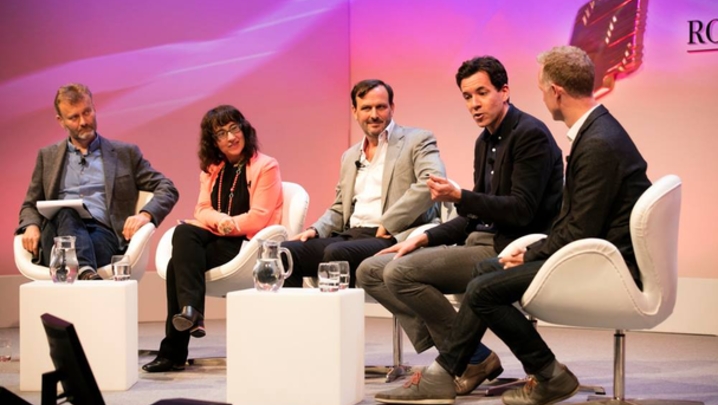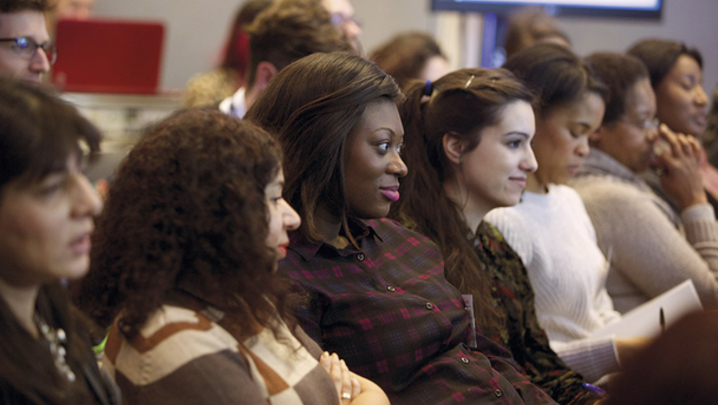An RTS panel hears why weird and wonderful shows such as The Masked Singer and I Can See Your Voice are transforming TV entertainment.
Brash, brazen and bonkers, Korean formats such as ITV’s The Masked Singer and BBC One’s I Can See Your Voice (ICSYV) have swept into British homes in Saturday-night primetime, grabbing audiences and plaudits alike.
In slots previously occupied by long-running shows such as The X Factor and Strictly Come Dancing, these South Korean formats encapsulate the joy of the new and original.
The Masked Singer melds elements of a guessing game, singing competition, comedy panel show, celebrity and an audience vote. All wrapped up with outrageous costumes, disguised voices and a big reveal every show.
ICSYV sees a guest artist and a team of two contestants presented with a group of six “mystery singers” — some are good singers while others are atrocious.
The contestants must attempt to eliminate bad singers from the group by guessing who they are without hearing them sing. Over the course of four rounds, they receive clues and help from the show’s celebrity panellists. The winning mystery singer is revealed as good or bad via a duet with one of the guest artists. The contestants win a cash prize if they get it right.
Korean TV powerhouse CJ ENM format sales executive Albert Park joined the RTS panel discussion from Seoul. The creator of ICSYV, he said that much of these shows’ success stems from a TV landscape in South Korea where producers are unafraid to try new things.
“I think originality and uniqueness is something that shapes our culture,” he explained. Park stressed that Korean audiences were very trend driven, and keen to share their opinions on both scripted and unscripted shows.
“It gives South Korea’s creative industry a unique atmosphere. All the creatives and directors know they have to listen to the voice of the audience, and those audiences are not afraid to speak out.”
The shows are ideal for digital audience consumption, with bite-sized, shareable footage perfect for posting on social media and so attracting younger audiences.
“We want to adapt to this digital age, change the environment and setting but always keep the original storytelling in our formats,” Park said.
Most Korean entertainment shows are created in-house. “What’s unique about Korea is that we have several producers that are assigned to bring in new ideas and formulate new developments. We also contract a lot of outside writers to bring in new ideas and then make junior pilots to test fresh ideas,” he explained.
In the UK, The Masked Singer is produced by Scottish indie Bandicoot (part of Argonon Group), co-founded by Derek McLean and Daniel Nettleton. McLean, executive producer of The Masked Singer and spin-off series The Masked Dancer, told the RTS that South Korean TV’s willingness to take risks appealed to him.
“It was such a fun, bonkers, different, silly way to do a singing show,” said McLean. A former creative director of BBC entertainment for BBC Studios, he knows a thing or two about prime-time, shiny-floor shows. “The first thing we saw and loved was that it was a guessing game. It felt like a hybrid of two genres.”
McLean noted that the other interesting thing about optioning a format from South Korea, and Asia generally, compared with European formats, was that Korean TV is happy for local partners to interpret the format in any way they think right for their audience.
“I believe that’s why you’re seeing such a massive success with all these formats, because the Korean format holders are very open to us changing the format to make it right for us,” he said.
Some European format holders are much more rigid and protective when it comes to adapting their shows.
“We knew we had to interpret The Masked Singer in the right way to make it feel authentically British,” he added. “They’ve given us the leeway to do that. I hope they feel that is the right thing to do.”
ICSYV has been a Saturday-night ratings hit for the BBC, averaging 3.8 million viewers per episode. Rachel Ashdown, BBC entertainment commissioning editor, said the first thing that struck her about the show was the number of reveals it had. “You see a lot of formats where everything happens at the very end of the show but, with ICSYV, you’re getting a reveal hit every 10 minutes,” she noted. “The show has that moment where you’d stay on the sofa and say, ‘I’ll just wait to see what happens to that one’ and, before you know it, it’s the end of the show.”
Amelia Brown, Managing Director of Thames (a Fremantle label) and executive producer of ICSYV, agreed. “The contestants can actually win some money for being terrible at something. It’s that easy,” she grinned.
Ashdown and Brown have been working on a Christmas special and the second UK season of ICSYV planned for 2022. They have noticed a big uptick in the number of bad singers auditioning for the show.
Ashdown said that, while any new peak-time Saturday-night show was not devoid of risk, as a public service broadcaster the BBC was allowed to take punts to find the next hit. “There was a lot of work put into it and a lot of thought. We can afford to take those risks because we are not beholden to shareholders,” she stressed. Ashdown and her colleague, BBC Entertainment controller Kate Phillips, always look for shows that possess heart, humour and scale for BBC One’s Saturday-night slots. Ashdown and Brown revealed they watch the audition tapes blind so they can play along with the guessing game.
Brown, who has been making shiny-floor shows for 20 years, including Britain’s Got Talent and The X Factor, said one of the key elements contributing to ICSYV’s success is having the contestants walk out on stage amid the mystery of whether they can sing or perform. Even that’s part of the guessing game, whether it’s an X Factor contestant or someone from Basingstoke telling the audience she is going to be Cher on Stars in their Eyes before emerging on to the stage after her transformation to gasps and applause from the audience.
The will they, won’t they keeps the audience on the edge of their sofas as they contemplate whether the contestant will be a good or bad singer for ICSYV.
“The Koreans took that very simple idea and ‘gamified’ it,” said Brown. “It was simple, but brilliant.” She said she and her team had squeezed every last drop of know-how from CJ ENM in mounting the UK version.
So how are these shows likely to evolve? The panellists agreed that formats featuring music competitions would continue to occupy key slots in the schedules, Korean or otherwise.
Park said CJ ENM was developing a host of shows that had musical guessing games. The guessing-game element was not a passing fad and was here to stay for the next few years at least.
Had working with Korean formats changed the way UK executives approached making entertainment shows, asked panel host Toby Earle.
“It’s quite easy, especially in development, to get stuck and think of variation, especially when you’ve been known for making a certain type of show,” replied Brown. “When you are in a working relationship with people who are risk-takers, who think of big ideas or genre-busting, it helps push you that way.”
Report by Stuart Kemp. TV critic and broadcaster Toby Earle chaired the RTS session, ‘I can see your next smash hit: Korea’s Saturday night success story’, held on 27 July. The producer was Lucy Hynes.




